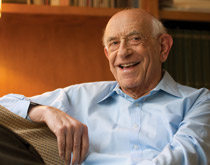In the 1970s, I was a lecturer in the Department of Chemical Engineering and Fuel Technology at the United Kingdom's University of Sheffield. Sheffield, like Pittsburgh, was a steelmaking hub, and my research in combustion science had commercial value. I frequently traveled to the United States to participate in contract meetings with NASA, DOE, Army, Navy, and combustion conferences. On one visit to the University of California at Berkeley, I met Tony Oppenheim, a researcher who was also the editor of an astronautics journal. I, also, wanted to have a journal. Tony took me to a conference and introduced me to Robert Maxwell, a flamboyant British publishing tycoon.

Naïve and brash, I decided to approach Mr. Maxwell, and told him that I wanted to found a journal on combustion science. I also told him I wouldn't tolerate interference from the publisher. He asked me, "Who are you?!" He then told me I had three problems. I wasn't famous enough to be an editor of one of his journals. I was too young and immature. And finally, I had the bloody cheek to tell him that he couldn't interfere.
I returned to Sheffield, disappointed. What I didn't expect, was a call six months later. "Are you the person who wanted me to publish your journal?" The questioner was Mr. Maxwell. He said that because I had the audacity to tell him not to interfere, then maybe I had potential to be an editor. I now had the problem of creating a journal without any association with organizations, institutes, or conferences. What if I couldn't get enough manuscripts? I thought it wise to broaden the journal's title, adding the word, energy. Progress in Energy and Combustion Science (PECS) was born.
The publication's mission differed from nearly all other academic journals. Contributors were expected to educate others on their level of expertise, not merely to promote their research. Authors would be invited by me to submit manuscripts. Unsolicited articles would be rejected. There would be no limitation on length. All manuscripts would be critically reviewed by six experts in the field. For several years, all reviews were on the subject of combustion. I've since expanded the scope of the journal to all aspects of energy and alternative energy, including nuclear, solar, wind, and bio-energy.
My publisher, Elsevier, the world's largest in science and engineering, has moved heavily into online publishing. Downloads of reviews in my journal have skyrocketed, especially in China and India. The Impact Factor, the recognized criterion of quality and excellence, based upon citations in other journals, of PECS, has now reached the extraordinary value of 11.024, and it's ranked as number one among energy and several engineering journals.
I am now deluged with authors requesting to have their reviews published. Elsevier has informed me there is no limit to the number of reviews I can submit for publication. The projected demand for oil coupled with increased scarcity, together with the impact of emission of pollutants from combustion engines on the climate and global warming, will only, in my estimation, accelerate the interest in and value of PECS.
-Norman Chigier
Norman Chigler, Carnegie Mellon professor emeritus, was the William Brown Professor of Mechanical Engineering and has received several international awards. He has been the sole editor of Progress in Energy and Combustion Science for 40 years. He is also the author of several books on combustion and sprays.



